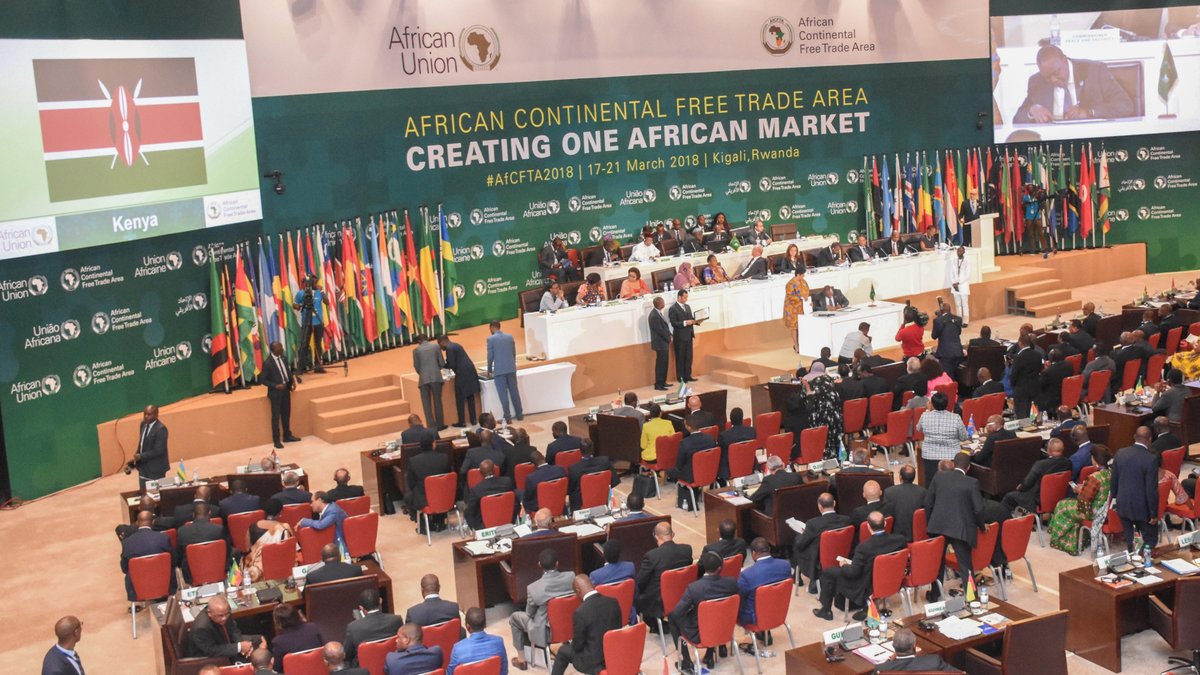…As 44 African heads of states ink treaty in Kigali
Following the failed signing of the African Continental Free Trade Area (AfCFTA) treaty, by President Muhammadu Buhari which can be observed from his absence at the AU meeting in Kigali, Rwanda on Wednesday, the Airline Operators of Nigeria (AON), has opened up on why it advised against the deal and Manufacturers Association of Nigeria lists grey areas.
Already, 44 African countries have signed an agreement establishing a free trade area seen as vital to the continent’s economic development, the head of the African Union (AU) said Wednesday.
Just as 44 other heads of governments in Africa were in Kigali, Rwanda signing the treaty, the Manufacturers Association of Nigeria (MAN) on Wednesday strongly supported federal government’s tactical refusal to sign the deal, saying there are critical contents of the agreement, that still need to be understudied by Nigerian Organised Private Sector (OPS).
Addressing media executives in Abuja, MAN President, Dr. Frank Jacobs said the agitation from the private sector was a result of lack of consultation and inclusion of inputs of key stakeholders before Nigeria’s position was presented at the meetings of the African Union-Technical Working Group on CFTA in the build-up to AfCFTA negotiation by Nigeria.
He said “The AfCTA is expected to create a trade bloc of 1.2 billion people with a combined gross domestic product (GDP) of more than $2 trillion. The agreement commits countries to removing tariffs on 90% of goods and to liberalize services”.
“The issues of market access that allows only 10 percent of products to be protected as well as government’s enforcement mechanism in the area of enforcement of rules of origin need to be clearly defined before local producers can support the agreement.
Whiel stressing that MAN is not oblivious of the benefits inherent in installing a continental trade agreement like AfCFTA that could improve intra-African trade and enhance economic growth and sustainable development, Jacobs said that Nigeria’s national interest should however be the primary consideration in the decision to sign-on to such an arrangement.
In his recommendations, Jacobs urged the government to set in motion a process that will enable all stakeholders on the international trade value chain in Nigeria to quickly review the text of the draft AfCFTA agreement and come up with comments on areas that are not in the best interest of the Nigerian economy and sectors.
“Government should, as matter of urgency, convene a special meeting of the relevant stakeholders, including experts on trade policy to consider tariff lines rates along the line of efficiency, sectoral and sub-sectoral preferences that would be most beneficial to Nigerian businesses under the AfCFTA dispensation as well as reconsider the national position on EPA vis-a-vis the AfCFTA especially on tariff lines of products on the sensitive/exclusion list, with a view to ensuring that the EU-EPA is not reintroduced through the AfCFTA’s back door.
“Review presentations and prepare a detailed submission for the Government on ways and means of participating in the AfCFTA in a manner that our national interest and that of the budding manufacturing sector are effectively protected”, he added.
On their own, the leadership revealed that other smaller African aviation markets ganged up with the major purpose of capturing the Nigerian market and gain from our huge potentials that are yet untapped.
According to AON, the avoidance of the Nigerian government to the treaty would go a long way in safeguarding the future of youths and unemployed Nigerians who will gain more when the Nigerian aviation industry is reformed and repositioned.
Chairman of the group, Capt. Nogie Meggison, also noted that whereas Nigeria has escaped from the continental trap, caution still need to be taken by the government to always study every international treaty before inking to avoid mortgaging the economic future of the country.
He said having effectively avoided the trap, “This is time for the government to seat with airlines, manufacturers and other entrepreneurs, technocrats and experts in exhaustive consultations to ascertain the impact of such a treaty in the Nigerian economy”.
“Even though treaty is good for the economy, the needed reforms and capacities of Nigerian airlines operators need to be raised so as to gain more than other African states before we can sign the deal,” Meggison averred.
Moussa Faki Mahamat, chairperson of the AU commission noted shortly after the signing in Kigali on Wednesday that “The agreement establishing the CFTA (African Continental Free Trade Area) was signed by 44 countries”.
The creation of a free trade area — billed as the world’s largest — comes after two years of negotiations, and is one of the AU’s flagship projects for greater African integration.
However, the agreement will still have to be ratified at a national level, and is only due to come into force in 180 days.
The full list of countries which did not sign the agreement is not yet available; however Nigeria is a notable absentee after President Muhammadu Buhari pulled out of this week’s launch in Rwanda saying he needed more time for consultations at home.
Nigeria, one of Africa’s largest markets, hesitated after objections from business leaders and unions — a sign that getting the deal through scores of national parliaments may face several hurdles.
According to Albert Muchanga, the AU Commissioner for Trade and Industry, “Some countries have reservations and have not finalised their national consultations. But we shall have another summit in Mauritania in July where we expect countries with reservations to also sign”.









